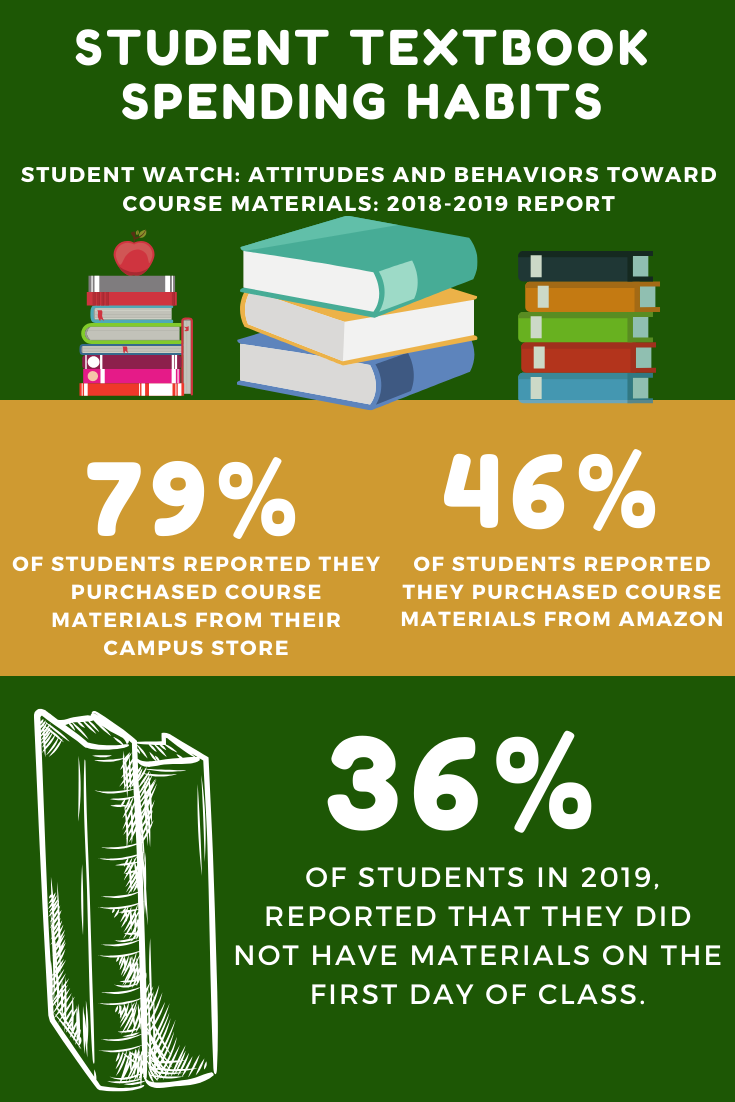Sac State considering textbook program for immediate course material access
Follett Access provides course materials through student fees
The inside of the Hornet Bookstore. Sac State is considering implementing Follet Access, a program that would give students access to course materials on the first day of class through tuition or course charges.
Sacramento State is considering the implementation of Follett Access, a service that would provide students with textbooks and course materials, primarily via e-books, on the first day of school by adding fees to a student’s account, university officials said.
Students would have the ability to opt-out of the program and receiving the materials, according to Jim Reinhart, executive director of UEI.
One of the biggest concerns faculty and staff have is the potential increase in tuition or additional fees. Cely Smart, chief of staff to President Robert Nelsen, echoed these concerns.
“I can assure you that the potential cost of this program is the issue at the forefront of all of our minds,” Smart said.
Costs to students at Sac State are not clear yet. Sac State is considering adopting a similar program as San Diego State, which implemented an immediate access program in 2016. At San Diego State, costs range from $19 to $122 per immediate access course, depending on expected costs of course materials.
Story continues below data visualization.

Follett Corp., provider of Follett Access, currently manages The Hornet Bookstore in partnership with University Enterprises, Inc.
RELATED: Hornet Bookstore reorganizes, leaves Sac State students confused
Follett Access includes the costs of course materials in a student’s tuition and course fees, according to Follett’s website. Students are charged after the add/drop deadline, and do not pay on the first day of school.
Follett said in marketing information that their program will “save students money.” San Diego State students saw discounts of 10 to 20 percent on digital course materials and 25 to 60 percent on rentals and hard copy purchases when their access plan was implemented.
According to Reinhart, immediate textbook access programs like Follett Access have improved student retention and graduation rates at schools that have implemented them.
“Sac State has successfully been using inclusive access programs in statistics, (management information systems) and other courses for several years,” Reinhart said.
Maritza Gamez, an environmental science major, said that her biology course included a textbook fee. She was charged automatically on the first day and told to pick up her textbook.
“Last spring I took Biology 1 with Professor Visger and was charged a fee for my textbooks and wasn’t told ahead of time about the charges,” Gamez said.
Gamez said the cost was unproportional with what she would have paid by renting the book through a third party.
“I was charged over $200 for a textbook that I could have rented for $40 or bought an older edition for half the price,” she said. “The textbook was for a lower division course that I couldn’t even sell back after not using it because they had already begun a new edition.”
Sac State is currently in the research phase and will be consulting faculty, staff and student leadership on the implementation of Follett Access. Sac State could see a pilot program in the 2020-21 academic year with incoming freshmen or transfer students, according to Reinhart.
Denisse Garcia, ASI vice president of finance and business major, said Follett Access has the potential to help students easily acquire textbooks that have an expensive price tag. Reduced textbook prices would allow students to enroll in courses they otherwise wouldn’t be able to enroll in due to excessive textbook prices, Garcia said.
“Overall, (Follett Access) has a lot of potential and it’s the most equitable way to provide textbooks for students,” Garcia said.
According to Follett, students at colleges with immediate textbook access programs showed improved grades and a decrease in class withdrawals, leading to improved graduation rates.
Nick Bailey, a computer science major, said that he would take advantage of Follett Access if it was implemented.
“I’ve been in classes where I had to get books in the first week or two and I can’t find them,” Bailey said. “So that makes it stressful and I fall behind in class, so I would definitely choose that option.”
The National Association of College Stores’ annual survey of college students showed that students are delaying purchasing course textbooks due to a belief that the course material are unnecessary or not knowing what course materials are needed.
The report also shows that students are spending less on course materials due to the availability of digital textbooks and bookstore rentals, competitive prices from third-party sellers like Amazon, and faculty using open educational resources.
Story continues below graph.
There have been issues with Follett’s immediate access textbook programs. At New York University, many students were unaware of the charges and the add/drop deadline to opt-out, the Washington Square News reported. This led to the university to extend the deadline due to a lack of communication of the opt-out option.
The California State University system has already seen the adoption of immediate access programs at San Diego State University, CSU Fullerton, CSU Long Beach and Cal Poly Pomona.
Steve Perez, provost and vice president of academic affairs at Sac State, said the university has not decided whether to implement the program or not.
“We are still consulting and gathering data on whether or not this would be the right choice for our student body,” Perez said.
Your donation will support the student journalists of Sacramento State University. Your contribution will allow us to purchase equipment and cover our annual website hosting costs.






















































































































